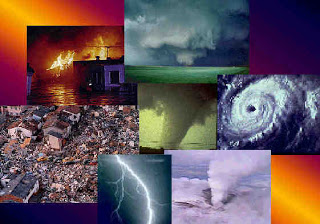Mike Adams
Natural News
From the point of view of many humans, the term “natural disaster” is a convenient scapegoat because it allow a person (or a whole nation) to blame nature for their own poor planning. Wherever we find so-called “natural disasters” around the world (such as Brazil at the moment), we also usually find a large group of people who have cut down the forests that buffer rainfall, paved over the grasslands that allow rain to soak into the soil, and built their homes right in the middle of gullies and natural drainage channels. When the floods come, they look to the sky and curse Mother Nature, shouting, “We got hit by a natural disaster!”
Of course, in some cases it really is a natural disaster. When a volcano blows and causes widespread destruction beyond what anyone could have reasonably foreseen — such as Mt St Helens in the 1980’s — that’s a legitimate natural disaster. When an under-the-ocean earthquake causes a fifty-foot tsunami that wipes out a beach town, that’s a legitimate natural disaster, too. When a large meteorite slams into the planet with the force of millions of atomic bombs, laying waste to an entire era of unique lifeforms (the dinosaurs, for example), that’s a natural disaster.
But getting wiped out by a flood because you built your house right in the flood path of a local river is not a natural disaster. That’s a man-made disaster. Or, more accurately, it’s just poor planning on the part of short-sighted humans. And when it comes to disasters, there’s plenty of short-sightedness to go around these days.
Poor planning
When I lived in Ecuador, I witnessed all sorts of homes being built right in the drainage pathways and low-lying flood zones of rivers with a known history of flooding. Even back in the United States, the federal government actually encourages people to build homes in flood zones and hurricane zones by offering “federal flood insurance” which is for the most part a way for the taxpayers to subsidize the risk of those who live in homes that never should have been built in those areas in the first place.
The entire fiasco of rebuilding the low-lying regions of New Orleans after Hurricane Katrina is a perfect example of mankind just begging to be hit with yet another “natural disaster.” It doesn’t take a genius to figure out that some time in the next 50 years, a category five hurricane is going to strike New Orleans yet again and reclaim the very same regions that technically belong under water as part of the Gulf of Mexico. (This is in no way meant to disparage the people of New Orleans, by the way, who are some of the most joyful and creative people you’ll ever meet. Great folks. Sad geologic situation, however. You can’t fight geology for long…)
Forest fires should never be a surprise
The most striking example of so-called “natural disasters” is when people build their homes in a giant forest, surrounded by trees, and then they seem surprised when those trees catch on fire and burn their homes to the ground. Did they really think that trees never burn? Do people honestly buy multi-million dollar homes in California and think that their homes will somehow be magically immune to the forest fires that inevitably sweep through all forests?
I don’t mean to make light of the loss of property and the human suffering that occurs during such events, but wouldn’t all that loss have been prevented if they thought more carefully about the situation in the first place?
Even the news gets it wrong. They’ll report things like, “The fire caused over $200 million in property damage…” Well, not exactly. The forest fire burned where it has always burned, every few decades, for probably tens of thousands of years. Fires are, in fact, crucial for the healthy functioning of forest ecosystems. And until humans started building homes in forest fire zones, those fires never caused any so-called “property damage.” So why is the fire to blame for destroying homes? Because people built their homes right where the fires burn every few decades!
Once you realize that, you can’t really blame the fire for destroying the homes. It’s not the fault of the fire. People shouldn’t build homes in forest fire zones.
See, when I look at a forest as a potential home site, the very first thing that comes to my mind is, “Sooner or later, these trees are going to burn.” It’s a natural cycle caused by lightning combined with a dry season that follows a wet growing season that produces lots of underbrush “fuel.” All it takes is one lightning strike to light it up, and from there the laws of chemistry take over.
When poor planning collides with natural repeating cycles
Most “natural” disasters are actually caused by poor human planning. Generally speaking, people don’t have a very long-term view of things. They don’t consider that the little creek running behind their new home could very easily wind up meandering through their living room after record rainfall. The cattle rancher who buys 500 acres of forest and then clear-cuts the trees to make room for cattle grazing (Brazil, anyone?) doesn’t usually consider the fact that they have now removed the rainfall / water buffer zone that protected their lands from floods and erosion.
Even professional city engineers often aren’t very bright about all this: They’ll design cities with enormous areas of pavement and roads, all while failing to properly consider the fact that what used to be dirt which once absorbed water is now concrete that channels water somewhere else. It doesn’t take much rain for a city of pavement to become a flash flood nightmare.



Be the first to comment on "Why most natural disasters aren’t natural at all"